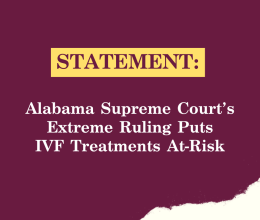“Our bodies, our choice.”
“Women’s bodies, women’s rights.”
“You can’t cuddle an embryo.”
“Mind your own uterus.”
Sound familiar? An abortion rights rally, right? Actually, no, not this time. These are the rallying cries resounding through the Alabama State House this week as doctors and patients and supporters of in vitro fertilization (IVF) have come together to demand a remedy to the Alabama Supreme Court’s ruling that frozen embryos constitute minor children under the law. This ruling has led IVF clinics to pause their services and left many IVF patients uncertain about whether or not they will be able to continue their pregnancy journeys. This is because in the normal cycle of IVF treatments, embryos are damaged or destroyed or they fail to implant in a person’s uterus. IVF clinics cannot operate if each loss of an embryo is considered the wrongful death of a minor child.
The ruling rests on the Court’s interpretation and application of a 2018 Constitutional Amendment that enshrines the “sanctity of unborn life and the rights of unborn children.” This was used to pass the Human Life Protection Act in 2019, which banned abortion from the moment of conception and went into effect after the Supreme Court of the United States overturned Roe v. Wade. Now it is being used to effectively end the ability of IVF clinics in Alabama to serve patients who want to start families but have difficulty conceiving naturally.
I’m sure there were plenty of people in Alabama that were thrilled to vote yes to protect the sanctity of life for unborn children in 2018 and to affirm that the Alabama constitution did not guarantee the right to an abortion. I’m less sure that they realized the extent to which the State could apply this law and what it would mean for people who wanted to become pregnant and start families but could not do so without medical intervention.
I have heard it said that the pause in IVF services is an “unintended consequence” of the fetal personhood movement that anti-abortion groups have been engaged in for decades.
Let me be clear - this was all very intentional…and they’re not done yet.
This is the next calculated and deliberate step in a coordinated, long-term strategy by a small, fringe group that is meant to strip women and people who are or may become pregnant of every last ounce of bodily autonomy and the freedom to make decisions about their own lives and their own families. And it doesn’t stop there. Everything in this ruling could be used to outlaw hormonal birth control and IUDs, which disrupt the implantation of a fertilized egg, or to criminalize miscarriage.
We will not let that happen.
All pregnancies - whether they are intentional or unintentional - and all life situations are unique. So many different considerations go into making decisions about one’s health, one’s body, one’s family, one’s future. And when people are making these very personal, often very difficult decisions, no one needs or wants the government in the room interfering with that process. One-size-fits-all laws are impractical and dangerous, and Alabamians deserve better.
This is the message of a whole new subset of people that have been ignited in the past two weeks in support of IVF services remaining accessible in Alabama. In scrambling to pass legislation this week to “save IVF”, many lawmakers are doing everything they can to isolate protections to this one aspect of infertility care without acknowledging the through line that threatens every other aspect of reproductive health. The bill that is being fast tracked through the legislature this week and will likely be signed into law by the governor very soon guarantees immunity for those providing or receiving IVF services. In other words, IVF doctors can kill human children and not be punished for it. In the case of someone who conceived naturally, however, a provider faces up to 99 years in prison for the same action. That is not a long-term solution.
Here’s the big hurdle: the doctrine of fetal personhood and a functioning infertility healthcare system are incompatible. Unless and until they address this problem at its core, nothing will be fixed. There is a shared experience between a couple sitting in the waiting room of an IVF clinic last week being told their pregnancy journey was on hold and the person sitting in the waiting room of an abortion clinic on June 24, 2022, being told the care they needed was now unavailable to them. The state is using fetal personhood to exert its control in both situations.
Now is the time to acknowledge and appreciate these shared experiences and to use our collective power to amplify the fact that access to abortion care is an important aspect of reproductive health and family planning, just like IVF is, just like birth control is.
Now that the context has changed and Alabamians better understand the implications of the 2018 sanctity of life amendment, we deserve a chance to re-vote on the amendment that landed us in the current situation. Additionally, we want to see Alabama lawmakers pass a comprehensive maternal healthcare bill that would address Alabama’s maternal and infant mortality crisis. The reproductive justice movement insists that all individuals and communities deserve access to the full range of health and social services that afford people the right to have or not have children and to raise those children in safe and healthy environments. So, while the IVF situation has brought a new urgency to the present moment, truly achieving reproductive justice is a long game. And all the people that have been recently activated by this infringement on reproductive healthcare - especially those that thought enshrining rights to the unborn would never affect them - need to stay in this fight to expand and protect reproductive freedoms broadly and permanently for all Alabamians.


